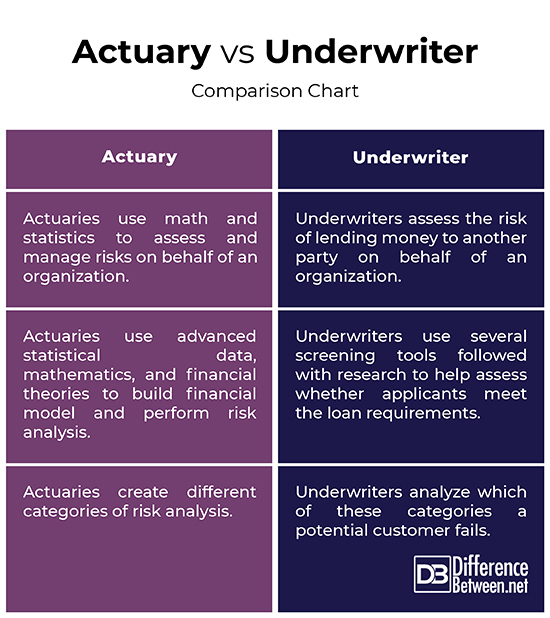Difference Between Actuary and Underwriter
Insurance plays a crucial role in business and human life. It provides a safety net against financial uncertainties. Most of us cannot anticipate what will happen in the future, so for such unforeseen circumstances insurance companies exist to pool money and payout to those who need financial support. But insurance companies need to identify the risks that come from insuring a business or an individual. They seek assistance from professionals to determine the relative risk of various decisions and help create policies for their business. Two such professionals are actuaries and underwriters.

What is an Actuary?
An actuary is a business professional who mostly works with insurance companies to identify, assess and manage risks associated with financial uncertainties. An actuary tries to predict the future and use statistics to help manage and measure risk. Apart from insurance companies, actuaries work for financial institutions, government organizations, consulting firms and other agencies. They provide crucial statistical data upon which major business decisions are based. Actuaries are needed where there’s something that cannot be measured or counted.
For example, an actuary for an insurance company may use math and statistics to estimate how much an insurance company has to set aside to be able to pay out to all the policy holders if something happens, or how much does a pension scheme has to put aside to be able to pay out benefits to the members. Actuaries are actually strategic thinkers and problem solvers, who use their skills, while also staying up-to-date with the current economic and social trends, to manage risks.

What is an Underwriter?
Underwriting is an important function in the financial world and an underwriter is a member of a financial organization, who works for insurance, investments, loan, or mortgage companies. Underwriting is probably one of the most important aspects of business wherein an underwriter analyses and assumes the risk of another party against a fee. An underwriter assesses the risk of lending money to another party on behalf of an organization. They assess the risks by looking at your finances and determine how much risk you will take if you decide to lend money or give a loan to some party.
For example, suppose you apply for a home loan with some bank. The underwriter in that bank looks at the lending guidelines, reviews your credit profile and your loan application together with all the documentation provided. Based on a thorough analysis, this underwriter first determines if the home loan meets the lending guidelines and based on that determines whether the bank should accept your loan application or not. Any change in your credit score, you employment, and your assets may impact the loan process. So, it’s the job of the underwriter to research, evaluate and quantify a financial risk.
Difference between Actuary and Underwriter
Role
– Actuaries are strategists who provide crucial statistical data upon which major business decisions are based. They compute risks and work out the premium rates to charge different categories of risk profiles based on several factors. Underwriters assess the risk of lending money to another party on behalf of an organization. They evaluate the applications to determine the appropriate risk profile the insurance should be categorized.
Tools
– Actuaries use advanced statistical data, mathematics, and financial theories to build financial model and perform risk analysis. They evaluate the past to make financial sense of the future of a company based on risk. They use their skills, while also staying up-to-date with the current economic and social trends, to manage risks. Underwriters, on the other hand, use several screening tools followed with research to help assess whether applicants meet the loan requirements.
Scope
– Actuaries mostly work in insurance and reinsurance companies. However, the scope of work of an actuary can expand beyond these fields. Actuaries can also work in financial institutions, banks, stock exchanges, wealth management companies, and investment firms. Underwriters are members of a financial organization, who work for insurance, investments, loan, or mortgage companies. Underwriters are mainly responsible for determining whether a borrower’s loan application meet the lending guidelines.
Actuary vs. Underwriter: Comparison Chart

Summary
Actuary and underwriters are two most popular career choices if you come from a background in mathematics and probability. Underwriting services assist firms in raising capital on financial markets. Underwriters basically decide which category an insurance applicant fits into by going through their finances, credit profile, employment record, and so on. Actuaries create those categories for risk analysis. They try to predict the future and use statistics to help manage and measure risk. The main difference between the two is the scope of the job.
Are insurance underwriters well paid?
According to U.S. Bureau of Labor Statistics, insurance underwriters get an average of $71,790 per annum in May 2020. The salaries for insurance underwriters may vary depending on where you work.
Will actuaries become obsolete?
In the U.S., the Bureau of Labor Statistics estimates a 20% increase in the Actuarial Science jobs by 2028. Actuaries get a lot of recognition these days, so it’s unlikely actuaries will go obsolete.
Is underwriting a dying career?
The BLS forecasts a decline in the employment rate by 6 percent by 2022. Although, underwriting is a good career for those looking for a role in the finance or insurance fields, the future of underwriting is uncertain.
Can an underwriter become an actuary?
Yes, an underwriter can become an actuary, but not necessarily. However, actuaries can become underwriters. You need at least a bachelor’s degree, followed by a series of exams to become an actuary.
Are actuaries intelligent?
Actuaries are strategic thinkers and problem solvers who use math and statistics to provide crucial data upon which major business decisions are based. So, actuaries are definitely intelligent.
Which type of actuary gets paid the most?
Actuaries in casualty insurance are probably among the most paid, followed by those in life insurance and health insurance.
Are actuaries still in demand?
According to BLS, there will be at least a 20% increase in the employment rate of actuaries globally by 2028. This suggests actuaries are actually in demand and the numbers are increasing every year, on average.
- Difference Between Caucus and Primary - June 18, 2024
- Difference Between PPO and POS - May 30, 2024
- Difference Between RFID and NFC - May 28, 2024
Search DifferenceBetween.net :
Leave a Response
References :
[0]Boudreault, Mathieu and Jean-François Renaud. Actuarial Finance: Derivatives, Quantitative Models and Risk Management. New Jersey, United States: John Wiley & Sons, 2019. Print
[1]Szabo, Fred. Actuaries' Survival Guide: How to Succeed in One of the Most Desirable Professions. Massachusetts, United States: Academic Press, 2012. Print
[2]Iannotta, Giuliano. Investment Banking: A Guide to Underwriting and Advisory Services. Berlin, Germany: Springer Science+Business Media, 2010. Print
